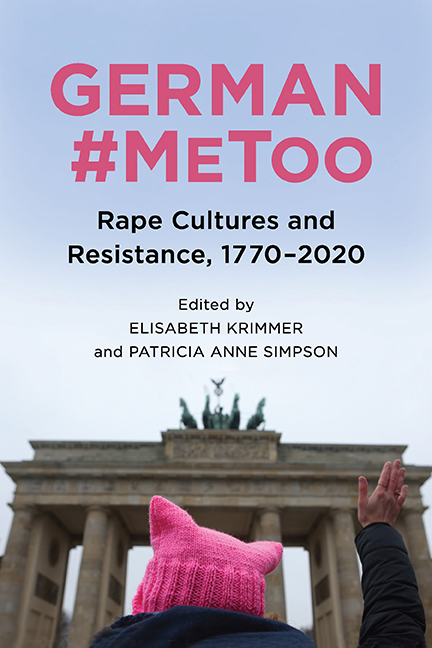2 - #MeToo: Prostitution and the Syntax of Sexualityaround 1800
Published online by Cambridge University Press: 08 October 2022
Summary
THE #ME TOO MOVEMENTS assumed specific national andregional characteristics while they circulatedglobally. In Germany, few powerful men fell fromprominence owing to allegations and proof of sexualharassment and predation. #MeToo did, however,reframe a debate about systemic sexism that revivedand expanded the agenda of twentieth-centuryfeminism. Still underexamined is the transhistoricalnormalization of the female body as object of apredatory, prurient gaze and the site of sexualviolence as spectacle. In Sexuality, State, and Civil Society in Germany,1700–1815 (1996), Isabel V. Hullelaborates the “sexual system” of Germany as itsleaders negotiate the transition from absolutism tothe modern state, with a focus on “the patternedways in which sexual behavior is shaped and givenmeaning through institutions.” Specifically, shemarks a semantic shift in the meaning of Dirne (prostitute), atransformation from the eighteenth-century model ofthe innocent victim seduced by a male villain to theprostitute, indicative of a nineteenth-centuryrevision in which the man becomes the victim of thepromiscuous, sexually incontinent woman. Hull'sargument underscores the exclusion of women fromcivil society. Though objectively true, this thesisis open to criticism, as James Van Horn Melton'sintervention reveals. He notes in Hull's work theabsence of women writers, salon hosts, and worksabout intellectual politics and practices thatinterrogate gendered exclusions. Moreover, as Iargue, the issues of female desire and pleasure—andtheir regulation—elude these analyses. Indeed, thereare few narratives in Western modernity thatacknowledge female sexuality without relegating itto the realm of innocent purity, sanctioned andcontractual reproductivity, or prostitution—that is,transactional sex, for whatever reason, subject tocivic regulation. In this chapter, I examine therepresentation of female sexuality and itssyntactical place in a range of texts that do not somuch challenge Hull's analysis as capturepost-Enlightenment obsessions with women as sexuallyactive yet innocent victims. First, I examine theconstruction of female submissiveness andvictimhood. With reference to two engravings, thePrussian legal code, and Immanuel Kant's moraljustification of marriage, I explore three texts byJohann Wolfgang von Goethe to demonstrate how femaledesire around 1800 is coded as sacrificial ortransactional. Finally, the displacement ofseduction, prostitution, and possible violence ismapped onto distant topographies, away from thepublic gaze.
- Type
- Chapter
- Information
- German #MeTooRape Cultures and Resistance, 1770-2020, pp. 59 - 80Publisher: Boydell & BrewerPrint publication year: 2022

